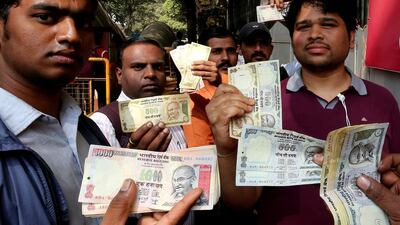Home sales in India could fall by up to 30 per cent in the first nine months of 2017 because of the government’s ban on the country’s biggest banknotes, analysts say.
The cash crunch from demonetisation could also weigh on prices, Kotak Institutional Equities said in a report last week. It is forecasting that at the same time as volumes drop by up to 30 per cent, prices could be cut by 7 to 12 per cent over the first six to nine months of the year.
“Demonetisation will result in lower volumes,” the Kotak report said. “Slower [sales] volumes worry us more than drop in pricing, as lower volumes will reflect in lower collections resulting in slowing construction and servicing of liabilities.”
In November, the government of prime minister Narendra Modi scrapped 500 (Dh27) and 1,000 rupee notes in an effort to crack down on black money. The property market in India has long been a major recipient of black money transactions. Demonetisation has created uncertainty and is prompting potential buyers to postpone purchases as they wait to see if prices will come down.
While analysts expect demonetisation to dampen the market over the first part of this year, they believe it could bring benefits later in the year.
“In the first half of 2017, the sector is expected to be largely muted and there would be pressure on prices,” said Shishir Baijal, the chairman and managing director of Knight Frank India. “With inquiries, walk-ins and sales drying up as a fallout of demonetisation, the first two quarters of the coming year will result in a substantial slowdown in sales.”
He said that in the longer term, demonetisation and new regulations that India is introducing to increase transparency “will help the sector to grow in a much more evolved manner”.
“The end of 2017 is most likely to see the initiation of a robust and sustainable growth trajectory for India’s real estate industry and will be recognised as the base for the future growth of this sector,” said Mr Baijal.
Surendra Hiranandani, the chairman and managing director of House of Hiranandani, a luxury property developer, said that interest rates are expected to come down this year because of the influx of cash into the banks following demonetisation, which along with discounts could encourage sales later in the year.
“Also, 2017 will see consolidation in the industry on the back of the changing economic scenario that is likely to weed out devious real estate developers,” he said.
business@thenational.ae
Follow The National's Business section on Twitter

